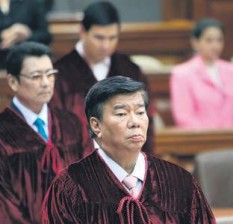Defense moves to oust Drilon
The defense panel on Thursday sought the inhibition of Senator Franklin Drilon from the impeachment trial of Chief Justice Renato Corona, accusing him of acting like “an ally” of and “carrying the cudgels” for the House prosecutors.
“It cannot be doubted that many persons perceive the conduct of Senator-Judge Drilon very disconcerting because of the obviously partisan character he exhibited,” the defense said in a 15-page motion.
“The actions of … Drilon have sparked controversy even among members of the viewing public,” it added. “The initiative (he) displayed … can be construed as unequivocal demonstration of his allegiance to the cause of the prosecution.”
The defense team said Drilon’s acts also showed that he lacked “cold neutrality and impartiality.”
Tranquil Salvador III, the defense team’s spokesperson, said his colleagues were “ready to face the consequences” of their decision to oust Drilon from the trial, expressing concern that the move may only cause more harm than good to them.
Article continues after this advertisement“We’ve come to a point that the defense team and the Chief Justice himself have become worried (of Drilon’s actions). That’s one of our considerations,” Salvador said.
Article continues after this advertisement“This is nothing personal against the senator. We don’t begrudge him. Even in the regular courts, we also ask the inhibition of a judge sometimes. This is just a reality in (judicial proceedings) and the senator knows this because he, too, is a lawyer.”
‘No basis’
“I will not inhibit because the motion has no basis,” Drilon told reporters. Asked whether he was affected by charges he was biased, Drilon said, “No. As in I feel nothing.”
In its pleading, the defense assailed Drilon’s role in compelling Supreme Court Clerk of Court Enriqueta Vidal to make public copies of Corona’s statement of assets, liabilities and net worth (SALN) when she took the witness stand on January 17.
The defense noted that Senate President Juan Ponce Enrile, as presiding officer, had then discharged Vidal as witness when private prosecutor Mario Bautista failed to elicit information about Corona’s SALN from her.
But before Vidal could leave the witness stand, Drilon asked Enrile if he could question Vidal.
Under grilling by Drilon, Vidal admitted that she had brought Corona’s SALNs with her in deference to the subpoena duces tecum ad testificandum that the Senate had issued against her.
“It appears … that the prosecution found an ally in … Drilon, who proceeded to ‘cross-examine’ and badger Vidal in the guise of ‘clarificatory’ questions,” the defense panel said.
Integrity of trial
The panel said Drilon’s meddling and the “pressure (he) exerted” on Vidal “resulted in the production of the SALNs of Corona which the prosecution was unable to accomplish on its own.”
Corona’s lawyers claimed Drilon “again displayed his partiality” when he made Randy Rutaquio, register of deeds of Taguig City and Pateros, admit that Corona acted as attorney in fact when his daughter, Maria Charina, bought property in Taguig.
The defense team noted that the prosecutors had wanted, but failed to show that Corona was the actual owner of the property and that his daughter merely acted as a dummy for him in presenting Rutaquio.
“(Drilon) made sure to highlight this fact as if to suggest that Corona was the beneficial owner of the property,” the defense said.
Daughter based abroad
“This ruse was cleverly done while suppressing the fact that Corona had to act as an attorney in fact because his daughter, Charina, is based abroad and cannot personally complete the purchase thereof.”
The defense said Drilon was able “to save the day for the prosecution” whose members had been repeatedly criticized by Enrile for their failure to prepare the presentation of evidence and witnesses.
“It is beyond cavil that this turn of events has put in question the integrity of the proceedings and the members of the impeachment court,” it said. “Every measure must be taken to guard against the erosion of public confidence in the impeachment trial of (Corona) lest the proceedings be rendered legally vulnerable.”
The lawyers said while the rules allowed senators to direct questions to witnesses and counsels, they said the senators must not “propound questions that amount to prosecuting the case or the witness.”
Cold neutrality
“In sum, it was (Drilon) who carried on the cudgels for the prosecution and accomplished what they failed to do,” the defense lawyers said.
“In open court, (Drilon) began to propound questions more akin to cross-examination and loaded with veiled threats, securing for the prosecution what they failed to do by themselves,” the defense said.
Citing a previous Supreme Court ruling, the defense noted that when a judge “takes the cudgels for one of the parties, he loses the cold neutrality of an impartial judge.”
“In other words, the refusal of an openly partial and biased judge is a violation of the Constitution,” the lawyers said.
They described as “unavailing and irrelevant” Drilon’s claims that he was just after the truth, reminding him that he should be a judge “both for the prosecution and defense.”
“The ‘search for truth’ poses no excuse to relieve a judge from his duty to observe the perception of impartiality … A judge must take every effort to avoid even the appearance of partiality,” the defense said. “This rule is the rule of thumb for all manner of judicial conduct and comportment, and it is well-entrenched in jurisprudence.” With a report from Cathy Yamsuan
